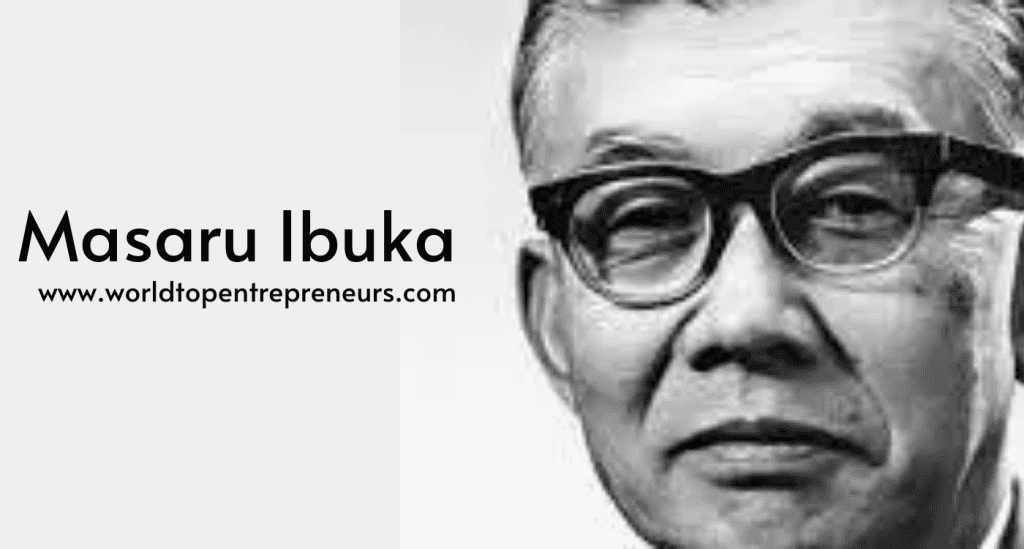Masaru Ibuka, one of the co-founders of Sony Corporation, is a name that resonates deeply within the realm of technology and entertainment. His pioneering spirit and innovative thinking played a crucial role in establishing Sony as a global leader in electronics. Ibuka’s journey from post-war Japan to becoming a trailblazer in consumer electronics is a testament to his vision, resilience, and passion for innovation. This article delves into Ibuka’s life, his role in founding and shaping Sony, and his enduring impact on the technology and entertainment industries.
Early Life and Education
Masaru Ibuka was born on April 11, 1908, in Nikko, Tochigi Prefecture, Japan. Raised in a time of rapid technological advancement and societal change, Ibuka’s early life was marked by a curiosity and fascination with technology. His upbringing in a family that valued education and intellectual curiosity laid the foundation for his future endeavors.
Ibuka’s academic journey began at Tokyo Imperial University (now the University of Tokyo), where he pursued studies in electrical engineering. His education provided him with a strong technical background, which would later prove invaluable in his career. However, Ibuka’s path was not a straight line; his studies were interrupted by World War II, during which he served in various capacities, including as an officer in the Japanese Navy.
Post-War Japan and the Birth of Sony
In the aftermath of World War II, Japan was faced with the monumental task of rebuilding its economy and infrastructure. Amidst this period of reconstruction, Masaru Ibuka and his colleague Akio Morita saw an opportunity to contribute to Japan’s recovery through technology and innovation.
In 1946, Ibuka and Morita co-founded Tokyo Tsushin Kogyo (Tokyo Telecommunications Engineering Corporation), which would later become Sony Corporation. The company’s founding was driven by a shared vision to create high-quality electronic products that could make a difference in people’s lives. Despite the challenges of post-war Japan, Ibuka’s entrepreneurial spirit and Morita’s business acumen laid the groundwork for what would become one of the world’s most influential technology companies.
Early Innovations and Breakthroughs
One of the earliest successes for Sony was the development of Japan’s first transistor radio. In 1955, Sony introduced the TR-55, a compact and affordable radio that marked a significant departure from the bulky, expensive radios of the time. This innovation not only demonstrated Ibuka’s commitment to quality and accessibility but also set the stage for Sony’s future successes.
The transistor radio was followed by other groundbreaking products, including the first portable transistor television. Ibuka’s vision extended beyond mere technical achievements; he sought to create products that would enhance people’s lives by combining advanced technology with practical design. This approach became a hallmark of Sony’s philosophy and contributed to the company’s early success.
The Sony Legacy and Ibuka’s Influence
Masaru Ibuka’s influence on Sony extended far beyond the development of individual products. His vision and leadership were instrumental in shaping the company’s culture and values. Ibuka was known for his commitment to research and development, believing that innovation was the key to staying ahead in the competitive electronics market.
One of Ibuka’s most significant contributions was his emphasis on fostering a creative and collaborative work environment. He encouraged employees to think outside the box and explore new ideas, creating a culture of innovation that became integral to Sony’s success. This approach not only led to the development of cutting-edge technologies but also inspired a generation of engineers and designers.
Ibuka’s focus on quality and user experience was evident in Sony’s products. He believed that technology should not only be advanced but also practical and user-friendly. This philosophy was reflected in the design of Sony’s products, which combined technical excellence with a commitment to meeting consumer needs.
Expansion and Global Reach
Under Ibuka’s leadership, Sony expanded its operations beyond Japan and established a strong presence in international markets. The company’s early forays into global markets were characterized by a blend of strategic vision and cultural sensitivity. Ibuka understood the importance of adapting Sony’s products and marketing strategies to fit different cultural contexts while maintaining the company’s core values.
One of the pivotal moments in Sony’s global expansion was the introduction of the Sony Walkman in 1979. The Walkman, a portable cassette player, revolutionized the way people listened to music. It was a product that embodied Ibuka’s vision of combining cutting-edge technology with practical design. The Walkman’s success not only solidified Sony’s position as a leader in consumer electronics but also marked a significant milestone in the company’s global reach.
Ibuka’s approach to international business was marked by a focus on building strong relationships with partners and customers. Sony’s success in global markets was a testament to Ibuka’s ability to navigate complex business environments and adapt to changing market dynamics.
Challenges and Adaptations
Despite Sony’s successes, Ibuka’s tenure was not without challenges. The company faced intense competition from other electronics manufacturers and had to navigate shifts in consumer preferences and technological advancements. Ibuka’s ability to adapt to these challenges was a testament to his strategic foresight and resilience.
One of the significant challenges Sony faced during Ibuka’s leadership was the transition from analog to digital technologies. As consumer preferences shifted towards digital media and new technologies, Sony had to adapt its product offerings and business strategies. Ibuka’s emphasis on research and development played a crucial role in guiding Sony through this transition and ensuring that the company remained competitive in a rapidly changing market.
Legacy and Contributions
Masaru Ibuka’s legacy extends beyond his role in founding Sony. His contributions to the technology and entertainment industries have had a lasting impact, shaping the way people interact with technology and media. Ibuka’s emphasis on innovation, quality, and user experience set a high standard for the electronics industry and inspired countless individuals and organizations.
Ibuka’s approach to leadership and business was characterized by a commitment to excellence and a willingness to take risks. His vision for Sony was not just about creating advanced technology but also about making a positive impact on people’s lives. This philosophy continues to be reflected in Sony’s products and corporate culture.
In addition to his contributions to technology, Ibuka was known for his dedication to education and philanthropy. He believed in the importance of nurturing young talent and supporting initiatives that contributed to societal progress. Sony’s commitment to corporate social responsibility and community engagement reflects Ibuka’s values and vision.
Personal Reflections and Impact
As Masaru Ibuka reflects on his career and achievements, he is likely to take pride in the impact he has had on Sony and the technology industry. His journey from a young engineer to a visionary leader is a testament to his dedication, creativity, and resilience.
Ibuka’s impact is also evident in the many individuals and organizations that have been inspired by his work. His contributions to technology and business continue to influence the way people approach innovation and problem-solving. As the world continues to evolve, Ibuka’s legacy serves as a reminder of the power of vision, creativity, and dedication.
The Future of Sony and Technology
Looking to the future, Sony’s continued success will be influenced by the principles and values established by Masaru Ibuka. The company’s commitment to innovation, quality, and user experience remains central to its strategy and vision. As new technologies and trends emerge, Sony will build on Ibuka’s legacy to drive progress and create products that enhance people’s lives.
Ibuka’s emphasis on research and development will continue to be a driving force behind Sony’s innovations. The company’s focus on exploring new technologies, from artificial intelligence to virtual reality, reflects Ibuka’s belief in the importance of staying ahead in a rapidly changing world.
In conclusion, Masaru Ibuka’s career is a remarkable story of vision, innovation, and leadership. His role in founding Sony and shaping the company’s success is a testament to his dedication and passion for technology. Ibuka’s legacy extends beyond his achievements at Sony; it encompasses a broader impact on the technology and entertainment industries. As Sony continues to evolve and adapt to new challenges, Masaru Ibuka’s contributions will remain an enduring source of inspiration and a reminder of the power of visionary leadership in the world of technology.





















